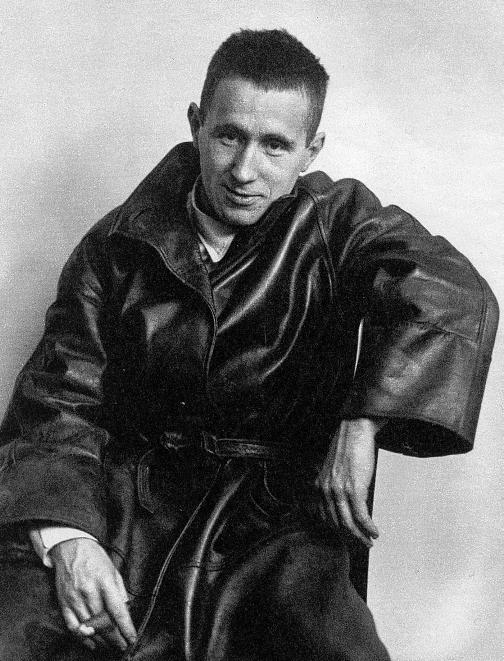Antonin Artaud, The Theater and its Double (1938)
-
Theatre of Cruelty
-
Born in Marseilles in 1896
-
Worked with and against the Surrealist Movement (Breton)
-
Short-lived theater group in Paris (long-time dream, Theatre of
Cruelty)
-
1937-46: Arrested in Ireland and interred in French mental
institutions
-
Not enthusiastic about Sartre and Existentialist Movement
-
Died at 52 in Paris in 1948
-
-
Antoninartaud.org:
a
bilingual site, with mostly links to other sites
Artaud's Theater of Cruelty
* spectator is in the center of the spectacle
(927b)
* come up with new masterpieces, or unknown
plays -- wants plays that respond to modern audiences (925)
* wants the audience to be active, not passive
(927b)
* wants actors to use GESTURE and physicality;
actors use original gestures
* no more "psychologically real" characters and
plays (926)
* "A violent and concentrated action is a kind
of lyricism" (Artaud 927).
* magic and ritual
Bertolt Brecht, "Theatre for Pleasure or Theatre for Instruction"
(1935-36)
-
Epic theater
-
Alienation Effect (Verfremdungseffekt)
Biography

- 1898: Born Eugen Bertold Friedrich Brecht in Augsburg, Germany
- 1914: Constructs a puppet theater with friends, even charging
admission
- 1917-21: Studies Medicine
- 1918: Works in army hospital
- 1923: Baal
- 1924-33: Works with directors Max Reinhardt and Ewin Piscator in
Berlin; develops theory of epic theater; becomes a Marxist
- 1928: Threepenny Opera with Kurt Weill
- 1933-41: Exile in Scandinavia
- 1941-47: Exile in California; tried for Un-American activities
and moves to Communist East Germany
- 1941: Mother Courage and Her Children
- 1943: The Life of Galileo; The Good Woman of Szechwan
- 1948: The Caucasian Chalk Circle; Antigone
- 1956: Dies of a heart attack in East Berlin
Brecht's Epic Theater
- Zeitstück =
contemporary play, Piscatorbühne
= Piscator's Stage, Lehrstück =
didactic play (Brecht 919)
- Völkischer Beobachter
(Brecht 921b) = People's Observer
* actors detach themselves from the character so that audiences can
critique the character; actors separate themselves from character
- Verfremdungseffekt
(V-Effekt) = alienation effect
- audiences might react with disgust rather than sympathy (920a)
* actors might wear masks
* actors acknowledge fourth wall
* Brecht wants his audience to react with
alienation to characters
* didactic theater: wants to teach audiences to
think
* screens to announce the plot of scenes or
projections that announce keywords
Works Cited.
Brecht, Bertolt. "Theatre for or Theatre for Instruction." Wadsworth Anthology of Drama. Ed.
W. B. Worthen. 4th ed. Boston: Thomson, 2004. 919-22.
Artaud, Antonin. "The Theater and Its
Double." Wadsworth Anthology of Drama. Ed. W. B. Worthen. 4th
ed. Boston: Thomson, 2004. 922-28.
